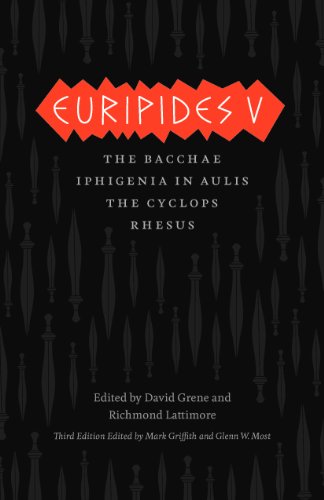Euripides V
Bacchae, Iphigenia in Aulis, The Cyclops, Rhesus (The Complete Greek Tragedies)
. Euripides
BOOK REVIEW

In the pages of Euripides V: Bacchae, Iphigenia in Aulis, The Cyclops, Rhesus, a tempest of raw human emotion blazes forth with an intensity that rattles the soul. These plays-vivid echoes of ancient Greece-are not mere theatrical artifacts; they are a dive into the labyrinth of the human psyche, exposing the torn fabric of morality, family loyalty, and the undeniable pull of fate. This volume doesn't just beckon; it ensnares you, compelling you to confront your own beliefs, doubts, and desires.
The Bacchae remains a riveting masterclass in the dance between order and chaos, temptation and restraint. Imagine the heart-wrenching tragedy of Agave, a mother driven to madness, her emotions spiraling into a whirlwind of despair as she unknowingly slays her own son. This is no mere tale of Greek mythology; it's an exploration of the darker recesses of human nature. In a world where the divine and the mortal clash with thunderous inevitability, Euripides challenges us to identify with the madness that can momentarily grip any of us. The visceral thrill of witnessing Agave's horrifying revelation is the haunting reminder of how love can morph into destruction when left unchecked.
Iphigenia in Aulis offers a different but equally potent punch to the gut. It's a story draped in the cloak of moral ambiguity. The protagonist, Iphigenia, finds herself hung between loyalty to family and the gods, her fate a devastating commentary on sacrifice and choice. Euripides masterfully crafts a narrative that compels you to ponder the burdens of duty versus the sanctity of personal will. When Agamemnon, Iphigenia's father, stands at the precipice of a choice that could lead to the salvation of Greece at the cost of his daughter's life, you can't help but feel the cold grip of desperation gripping your own heart. It's a conundrum echoing through the ages: what would you sacrifice for glory?
The Cyclops, on the other hand, infuses the collection with a refreshing blend of dark humor and absurdity. Euripides takes the well-known myth of Odysseus and infuses it with a quirky flair. Imagine the nuances of mockery and clever repartee in a narrative overshadowed by impending doom. Here, you're engaged not just with the action but with a commentary on the flaws of humanity-each character a caricature, each decision echoing folly.
In Rhesus, the stakes are high, and the betrayal runs deep. This play unfolds the treacherous landscape of friendship and loyalty in wartime, showcasing the harsh realities of conflict. Euripides allows the audience to witness the grievous consequences of treachery-an unforgiving lens through which we examine our own actions in times of crisis. It's a sobering reminder of the fragility of trust and the catastrophic potential of betrayal, all set against the backdrop of a relentless war.
Readers have been spellbound-and often polarized-by Euripides' potent narratives. Some laud his ability to blend emotional depth with philosophical quandaries, while others argue that his characters are too swept away by their passions, lacking in solidarity. Scholars debate the layers of moral complexity embedded in his works, which continue to resonate, inciting discussions that traverse time and space. The countless performances and adaptations that have stemmed from these plays serve as a testament to their timeless relevance.
Euripides, often seen as the underdog of Greek tragedy, takes risks that challenge societal norms and moral expectations. His stories don't provide neat resolutions; instead, they open doors to questions that linger long after the curtains fall. They invite you to explore the chaos of existence itself-reminding you that even in the face of horror, beauty may rise in unexpected forms.
So, why should you immerse yourself in this collection? Because within its pages lies a treasure trove of insight into our shared humanity. The emotional rollercoaster offered by Euripides will resonate with your deepest fears, desires, and the inexorable threads of fate that bind us all. In a world where understanding each other feels ever elusive, these plays pierce through the veils of time and culture, wielding a power that's profoundly unifying.
In short, to traverse through Euripides V is to engage with the heart of theatrical brilliance-each word reverberating across the chasms of history, inviting you to reflect, feel, and emerge transformed. 💫 Don't let the opportunity slip away-dare to unearth the wrestling matches between gods and men, and in doing so, discover the tempest that rages within each of us.
📖 Euripides V: Bacchae, Iphigenia in Aulis, The Cyclops, Rhesus (The Complete Greek Tragedies)
✍ by . Euripides
🧾 284 pages
2013
#euripides #bacchae #iphigenia #aulis #cyclops #rhesus #the #complete #greek #tragedies #euripides #Euripides